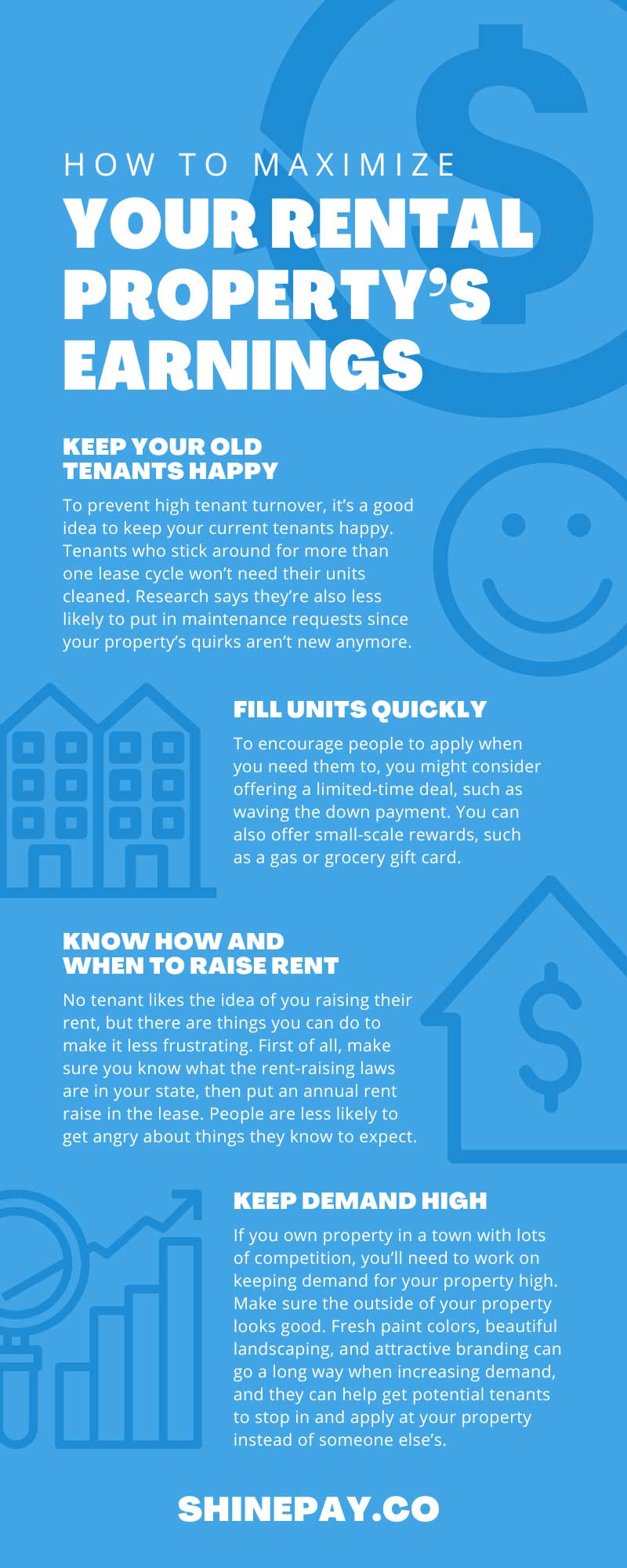The media loves to vilify landlords as greedy and neglectful, but the reality of property management is less easy to caricature. Landlords are just people who invest in property and expect to see a financial return.
Unfortunately, rising property taxes and other issues can cut into a landlord’s profits and make it hard to sustain a living. Follow these tips on how to maximize your rental property’s earnings without losing tenants.
Keep Your Old Tenants Happy
Tenant turnover is one of the most expensive parts of managing a rental property. When a tenant moves out, landlords have to make the unit livable for the next renter. This often means changing out carpets, repainting walls, upgrading appliances and fixtures, and replacing damaged items such as window blinds. When you add on the cost of hiring workers to do the repairs, turnover gets quite expensive.
Another reason that it’s more expensive to have your tenants move out is that it leaves a unit empty. When a unit is empty, there’s no one paying rent, and any utilities fall to the landlord to pay. The longer that unit goes without a tenant, the more money you lose out on.
To prevent high tenant turnover, it’s a good idea to keep your current tenants happy. Tenants who stick around for more than one lease cycle won’t need their units cleaned. Research says they’re also less likely to put in maintenance requests since your property’s quirks aren’t new anymore.
Survey Your Tenants
Asking your tenants for feedback on your property is key to encouraging your current tenants to stick around. Send out a survey and let your renters give you honest feedback—you can even encourage them to answer by offering a prize drawing.
Once you get the feedback, see if there’s a consensus or a popular request that you can meet. Develop a plan to meet the request, then send word to your tenants that you’re making a change they requested. Even if the change is small, your tenants will appreciate the message that you care and are willing to take action to improve things.
Fill Units Quickly
As mentioned above, one of the major costs of tenant turnover is having empty units. To mitigate this problem, you’ll need to find ways to fill units quickly, reducing the time they spend unoccupied.
To encourage people to apply when you need them to, you might consider offering a limited-time deal, such as waving the down payment. You can also offer small-scale rewards, such as a gas or grocery gift card.
One other thing to remember about keeping your units filled is to avoid letting people start leases at weird times. It actually benefits you to have leases start and end at the same time as other properties. This way, you can run a special application deal and get all your properties filled in a short span of time.
Know How and When To Raise Rent
No tenant likes the idea of you raising their rent, but there are things you can do to make it less frustrating. First of all, make sure you know what the rent-raising laws are in your state, then put an annual rent raise in the lease. People are less likely to get angry about things they know to expect.
To make sure you don’t run into any legal issues, always notify your tenants at least 45-60 days before the end of their lease. This gives them enough time to find a new place if they decide to leave.
If you decide that a rent hike is unavoidable, and it’s not already a part of your lease agreement, there are some things you can do to prevent mass turnover. If you’ve already been working with your tenants to implement requested changes, point these things out in your notice. And if you haven’t been taking good care of tenant requests, now is as good a time as any to start.
Offering Low-Cost Concessions
Like the limited-time deals that get more people to apply for your property, low-cost concessions can help sway people who are thinking of leaving in your favor. These concessions might include:
- Repainting units
- Upgrading appliances
- Offering covered parking
- Adding security features
The trick is to put your money toward projects that will impact the majority of your tenants rather than just one unit. Community amenities may look more expensive, but they’re far cheaper than doing dozens of individual jobs. They usually cost less in labor, too.
Keep Demand High
If you own property in a town with lots of competition, you’ll need to work on keeping demand for your property high. Make sure the outside of your property looks good. Fresh paint colors, beautiful landscaping, and attractive branding can go a long way when increasing demand, and they can help get potential tenants to stop in and apply at your property instead of someone else’s.
Technology Integration
One of the best ways to increase demand for your units is to implement technology wherever possible. Using the latest tech sends an important message to potential and current residents: that you actively manage your property and want everything to work well. On the other hand, a property that uses outdated tech will seem cheap and neglectful, falling into old tropes about greedy management.
Laundry is one place where every property can implement better technology. For laundry rooms, there are unique laundry room apps that speed things up and make management easier. For example, ShinePay offers an app-based payment system that lets tenants scan a machine and get started on their laundry, without needing to open their wallets. Property management then gets to see everything tracked in one place, including traditional coin payments.
Small Changes, Big Value
Some of the best ways to maximize your rental property’s earnings aren’t big or flashy, and they still make a huge difference. ShinePay can help landlords and property managers get more out of their investments by increasing tenant happiness. Our system also helps you reduce waste, and deters theft by eliminating coins.
If you’d like to see how our unique technology can improve your property, call or email us today. We offer payment systems for laundry as well as vending and EV chargers. Let ShinePay help you maximize your property’s potential.

